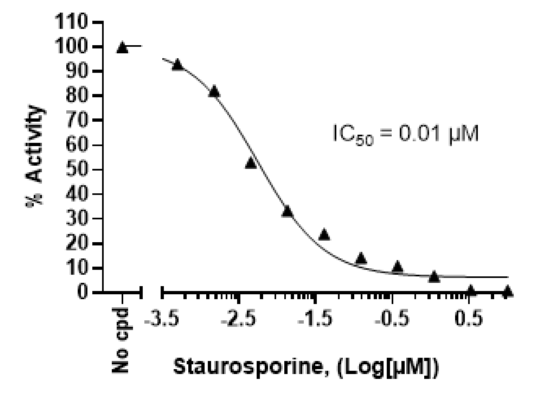Chemi-Verse™ CLK3 Kinase Assay Kit
The Chemi-Verse™ CLK3 Kinase Assay Kit is designed to measure CLK3 (CDC-like kinase 3) kinase activity for screening and profiling applications using ADP-Glo™ as a detection reagent. The assay kit comes in a convenient 96-well format, with enough purified recombinant CLK3 kinase, kinase substrate, ATP, and kinase assay buffer for 100 enzyme reactions.
- ADP-Glo™ Kinase Assay (Promega #V6930)
- DTT (Dithiothreitol), 1M, optional
- Microplate reader capable of reading luminescence
- Adjustable micropipettor and sterile tips
- 30°C incubator
| Catalog # | Name | Amount | Storage |
| 40198 | CLK3, GST-Tag Recombinant* | 2.5 µg | -80°C |
| 79334 | 5x Kinase Buffer 1 | 1.5 ml | -20°C |
| 79686 | 500 µM ATP | 50 µl | -20°C |
| 78514 | Myelin basic protein (MBP), 5 mg/ml | 50 µl | -20°C |
| 79696 | White 96-well plate | 1 | Room Temp |
*The concentration of the protein is lot-specific and will be indicated on the tube.
CDC-like kinase 3 (CLK3) is part of the dual-specificity protein kinase (DSK) family that phosphorylate serine/arginine rich (SR) proteins that are part of the spliceosomal complex and also regulate non-splicing proteins. Dysfunction in pathways regulated by CLK3 can result in cancer. CLK3 is upregulated in cholangiocarcinoma (CCA), hepatocellular carcinoma (HCC) and hematopoietic stem cells pathologies. The mechanism of action in each disease seems to be specific, with CLK3 activating Wnt3a transcription and increasing cell proliferation and migration in HCC, but it works in a CLK3-USP13-c-Myc feedback loop in CCA. CLK3 also contributes to HIV infection by promoting the expression of Gag and viral RNA. The use of chlorhexidine, a CLK2 /3/4 inhibitor, for HIV-1 treatment has shown in promising results in decreasing viral replication and prevention of mother-to-child transmission (MTCT). The development of CLK3 specific inhibitors and a deeper understanding of its role in the multiple pathways where it is involved will prove crucial for the treatment of CLK3-linked diseases.
Song M., et al., 2023 Signal Transduction and Targeted Therapy 8: 148.


